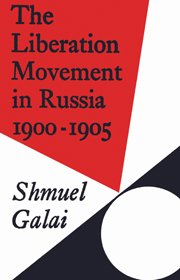Book contents
- Frontmatter
- Contents
- Dedication
- Acknowledgments
- Note on dates, etc.
- List of abbreviations
- Introduction
- Part One ORIGINS
- Part Two THE FORMATION OF THE LIBERATION MOVEMENT
- 5 The launching of the Liberation Movement
- 6 The organization of public opinion
- 7 The intelligentsia in ascendency
- 8 The formation of the Union of Liberation
- Part Three WAR AND REVOLUTION
- Appendix A The origins of Beseda
- Appendix B A bibliographical note on the writings of Kuskova and Prokopovich in the years 1898–9
- Appendix C Note on sources on the formation of the Liberation Movement
- Bibliography
- Index
7 - The intelligentsia in ascendency
Published online by Cambridge University Press: 22 September 2009
- Frontmatter
- Contents
- Dedication
- Acknowledgments
- Note on dates, etc.
- List of abbreviations
- Introduction
- Part One ORIGINS
- Part Two THE FORMATION OF THE LIBERATION MOVEMENT
- 5 The launching of the Liberation Movement
- 6 The organization of public opinion
- 7 The intelligentsia in ascendency
- 8 The formation of the Union of Liberation
- Part Three WAR AND REVOLUTION
- Appendix A The origins of Beseda
- Appendix B A bibliographical note on the writings of Kuskova and Prokopovich in the years 1898–9
- Appendix C Note on sources on the formation of the Liberation Movement
- Bibliography
- Index
Summary
While the public opinion campaign was gathering momentum, the first issue of Osvobozhdeniye appeared in Stuttgart (on 18 June/1 July 1902). This issue reflected the belief of the founders of the Liberation Movement that the main strength of the hoped-for liberal party would come from the zemstvo milieu, as well as their decision to tone down their programme accordingly. Besides the announcement ‘From the Russian Constitutionalists’, the first issue of Osvobozhdeniye carried two additional programmatic statements: one in the form of an ‘Open Letter from a Group of Zemstvo Activists’ and the other an article by Struve in which he outlined his intended editorial policy.
The ‘Open Letter’ was a more or less straightforward statement of moderate constitutionalism. After dwelling at length on the current political crisis, the authors pledged their full support to Osvobozhdeniye and its programme as reflected in ‘From the Russian Constitutionalists’. They made it plain that the programme as they understood it was aimed at bringing pressure to bear on the government to grant a constitution from above and thus prevent a revolution from below. They ended the ‘Letter’ with a declaration which was bound to arouse the wrath of the radical members of the ‘Friends of Liberation’ circles. ‘We…will do all in our power and ability to help to eliminate the anarchy caused by the government and by the people…which threatens to engulf Russia in prolonged and completely unnecessary suffering, violence and bloodshed.’
- Type
- Chapter
- Information
- The Liberation Movement in Russia 1900–1905 , pp. 157 - 176Publisher: Cambridge University PressPrint publication year: 1973



